英语作文转基因食品ShouldGeneticallymodifiedFoodbeSto ed
- 格式:docx
- 大小:9.23 KB
- 文档页数:2
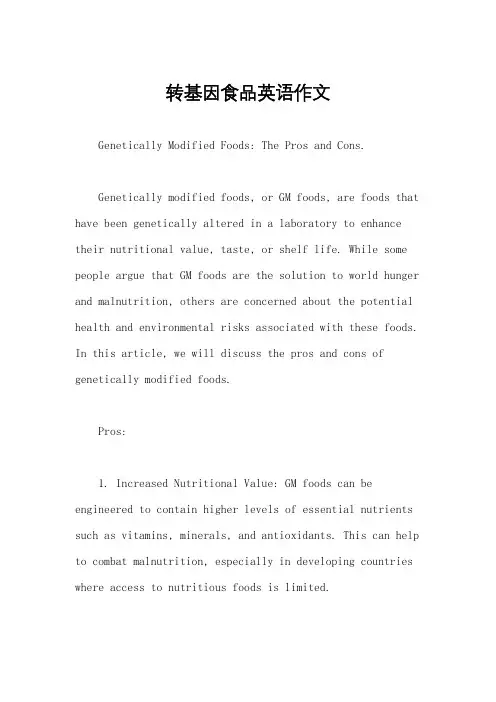
转基因食品英语作文Genetically Modified Foods: The Pros and Cons.Genetically modified foods, or GM foods, are foods that have been genetically altered in a laboratory to enhance their nutritional value, taste, or shelf life. While some people argue that GM foods are the solution to world hunger and malnutrition, others are concerned about the potential health and environmental risks associated with these foods. In this article, we will discuss the pros and cons of genetically modified foods.Pros:1. Increased Nutritional Value: GM foods can be engineered to contain higher levels of essential nutrients such as vitamins, minerals, and antioxidants. This can help to combat malnutrition, especially in developing countries where access to nutritious foods is limited.2. Improved Shelf Life: GM foods can be designed to resist spoilage, which can reduce food waste and increase the availability of fresh produce.3. Increased Crop Yields: GM crops can be engineered to resist pests, diseases, and harsh environmental conditions, which can increase crop yields and reduce the need for pesticides and herbicides.Cons:1. Health Risks: Some studies have suggested that GM foods may have negative health effects, such as allergic reactions, antibiotic resistance, and toxicity. More research is needed to fully understand the long-term health effects of consuming GM foods.2. Environmental Risks: GM crops can potentially harm the environment by contaminating non-GM crops, disrupting ecosystems, and reducing biodiversity.3. Ethical Concerns: Some people argue that GM foodsare unethical because they involve manipulating the genetic makeup of living organisms for human benefit, which raises questions about the moral implications of playing God.In conclusion, genetically modified foods have both pros and cons. While they have the potential to alleviate hunger and malnutrition, increase crop yields, and reduce food waste, they also pose potential health and environmental risks and raise ethical concerns. It is important for consumers to be informed about the potential risks and benefits of GM foods so that they can make informed decisions about what they eat.。
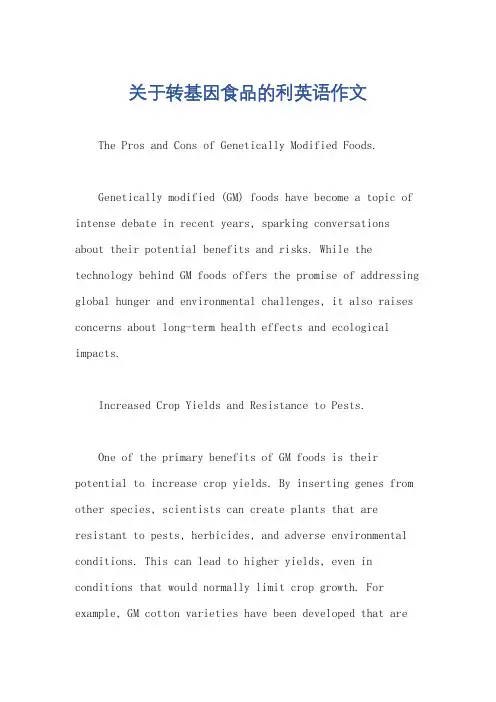
关于转基因食品的利英语作文The Pros and Cons of Genetically Modified Foods.Genetically modified (GM) foods have become a topic of intense debate in recent years, sparking conversations about their potential benefits and risks. While the technology behind GM foods offers the promise of addressing global hunger and environmental challenges, it also raises concerns about long-term health effects and ecological impacts.Increased Crop Yields and Resistance to Pests.One of the primary benefits of GM foods is their potential to increase crop yields. By inserting genes from other species, scientists can create plants that are resistant to pests, herbicides, and adverse environmental conditions. This can lead to higher yields, even in conditions that would normally limit crop growth. For example, GM cotton varieties have been developed that areresistant to the cotton bollworm, a major pest that can decimate cotton crops. Similarly, GM corn and soybeans have been engineered to tolerate glyphosate, a widely used herbicide, allowing farmers to control weeds withoutharming their crops.Reducing the Use of Pesticides.GM crops can also help reduce the need for pesticides, which are often harmful to both human health and the environment. By engineering plants to be resistant to pests, farmers can reduce their reliance on chemical pesticides. This not only lowers the environmental impact of farmingbut also reduces the risk of pesticide residue on food, which can pose health risks to consumers.Addressing Global Hunger.Another potential benefit of GM foods is their role in addressing global hunger. As the world's population continues to grow, so does the demand for food. GM crops, with their increased yields and resistance to adverseconditions, could help meet this demand, particularly in areas where traditional crops struggle to thrive. By providing a more stable food supply, GM foods could contribute to global food security and reduce hunger.Environmental Benefits.GM crops can also have environmental benefits. For example, GM varieties of rice and sorghum have been developed that can grow in saline or drought-prone areas, expanding the range of suitable cropland. This not only increases food production but also helps preserve natural habitats by reducing the need to convert additional landfor farming.Potential Health Risks.Despite these benefits, GM foods also raise concerns about potential health risks. One of the main concerns is the long-term impact of consuming GM foods on human health. While many studies have found no significant differences between GM and non-GM foods in terms of safety andnutrition, some studies have suggested that GM foods may cause allergic reactions or affect the digestive system. These findings, however, are still controversial and require further research.Ecological Impacts.Another concern is the ecological impact of GM crops. The introduction of GM varieties into the environment could potentially disrupt natural ecosystems by altering the interactions between plants, insects, and other organisms. For example, GM crops that are resistant to pests could lead to an increase in the population of those pests, potentially causing harm to non-GM crops or wild plants. Additionally, the spread of GM genes into related species through cross-pollination could lead to the loss of genetic diversity, affecting the resilience of natural ecosystems.Consumer Choice and Labeling.Finally, there are also issues related to consumer choice and labeling. Consumers have the right to know whatthey are eating and to choose whether or not to consume GM foods. However, the labeling of GM foods is often inconsistent and can be misleading. This lack of transparency can make it difficult for consumers to make informed decisions about their food choices.In conclusion, GM foods present both opportunities and challenges. The potential benefits of increased yields, reduced pesticide use, and addressing global hunger are significant. However, the potential health and ecological risks, as well as issues related to consumer choice and labeling, must also be carefully considered. As we continue to debate the merits of GM foods, it is important to approach the topic with an open mind and a commitment to scientific rigor. Only through careful research and public engagement can we ensure that GM foods are used responsibly and to the benefit of all.。
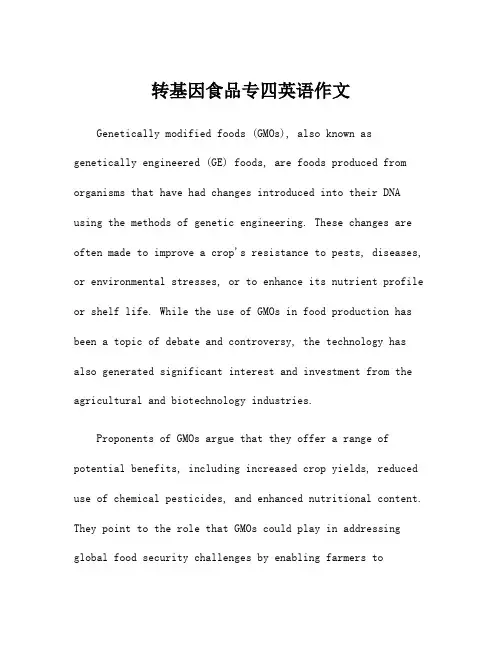
转基因食品专四英语作文Genetically modified foods (GMOs), also known as genetically engineered (GE) foods, are foods produced from organisms that have had changes introduced into their DNA using the methods of genetic engineering. These changes are often made to improve a crop's resistance to pests, diseases, or environmental stresses, or to enhance its nutrient profile or shelf life. While the use of GMOs in food production has been a topic of debate and controversy, the technology has also generated significant interest and investment from the agricultural and biotechnology industries.Proponents of GMOs argue that they offer a range of potential benefits, including increased crop yields, reduced use of chemical pesticides, and enhanced nutritional content. They point to the role that GMOs could play in addressing global food security challenges by enabling farmers toproduce more food on less land with fewer inputs. GMOs also have the potential to address specific nutritional deficiencies in certain populations, such as vitamin A deficiency, through the development of biofortified crops.Critics of GMOs raise concerns about potential risks to human health and the environment. They argue thatinsufficient research has been conducted to fully understand the long-term impacts of consuming GMOs, particularly in relation to allergenicity and toxicity. There are also concerns about the potential for GMOs to cross-pollinate with wild or non-GMO crops, leading to unintended consequences for biodiversity and ecosystems. Additionally, the corporate control of GMO technology by a handful of large multinational companies has raised questions about the concentration of power and influence in the global food system.As the debate over GMOs continues, it is important to consider the perspectives of different stakeholders,including scientists, farmers, consumers, and policymakers. Both the potential benefits and risks of GMOs should be carefully evaluated in order to make informed decisions about their use in food production. This may require robust regulatory frameworks, transparent labeling practices, and ongoing research to monitor the impacts of GMOs on human health, the environment, and the broader food system.In conclusion, GMOs have the potential to offer significant benefits for food production, but they also raise important questions and concerns that need to be addressed. As technology continues to advance, it is crucial to approach the use of GMOs in a responsible and evidence-based manner, taking into account a wide range of social, environmental, and ethical considerations. By doing so, we can work towards a food system that is sustainable, equitable, and supportive of human and planetary health.。
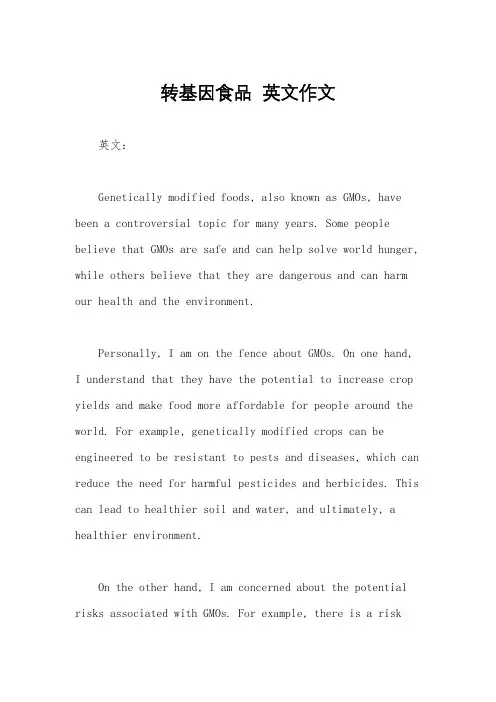
转基因食品英文作文英文:Genetically modified foods, also known as GMOs, have been a controversial topic for many years. Some people believe that GMOs are safe and can help solve world hunger, while others believe that they are dangerous and can harm our health and the environment.Personally, I am on the fence about GMOs. On one hand, I understand that they have the potential to increase crop yields and make food more affordable for people around the world. For example, genetically modified crops can be engineered to be resistant to pests and diseases, which can reduce the need for harmful pesticides and herbicides. This can lead to healthier soil and water, and ultimately, a healthier environment.On the other hand, I am concerned about the potential risks associated with GMOs. For example, there is a riskthat genetically modified crops could crossbreed with wild plants, creating hybrid species that could be harmful to the ecosystem. Additionally, there is a risk that genetically modified foods could have negative effects on human health, such as allergies or other health problems.Overall, I think that there needs to be more research done on GMOs before we can make a definitive decision about their safety and effectiveness. In the meantime, I think it is important for consumers to be informed about the foods they are eating and to make their own decisions about whether or not they want to consume genetically modified foods.中文:转基因食品,也称为GMO,已经成为多年的争议话题。
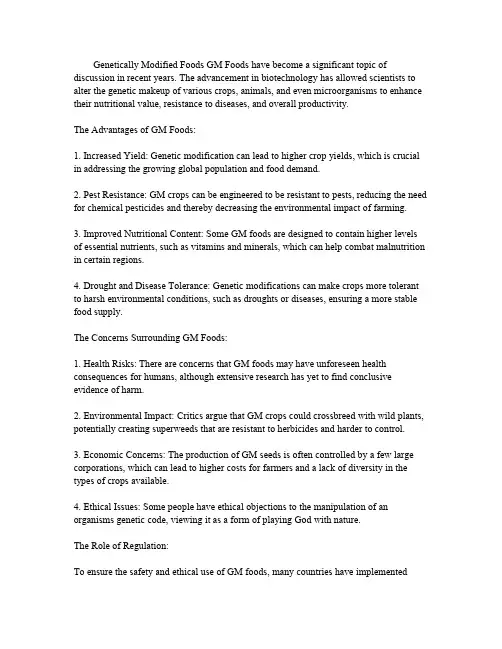
Genetically Modified Foods GM Foods have become a significant topic of discussion in recent years.The advancement in biotechnology has allowed scientists to alter the genetic makeup of various crops,animals,and even microorganisms to enhance their nutritional value,resistance to diseases,and overall productivity.The Advantages of GM Foods:1.Increased Yield:Genetic modification can lead to higher crop yields,which is crucial in addressing the growing global population and food demand.2.Pest Resistance:GM crops can be engineered to be resistant to pests,reducing the need for chemical pesticides and thereby decreasing the environmental impact of farming.3.Improved Nutritional Content:Some GM foods are designed to contain higher levels of essential nutrients,such as vitamins and minerals,which can help combat malnutrition in certain regions.4.Drought and Disease Tolerance:Genetic modifications can make crops more tolerant to harsh environmental conditions,such as droughts or diseases,ensuring a more stable food supply.The Concerns Surrounding GM Foods:1.Health Risks:There are concerns that GM foods may have unforeseen health consequences for humans,although extensive research has yet to find conclusive evidence of harm.2.Environmental Impact:Critics argue that GM crops could crossbreed with wild plants, potentially creating superweeds that are resistant to herbicides and harder to control.3.Economic Concerns:The production of GM seeds is often controlled by a few large corporations,which can lead to higher costs for farmers and a lack of diversity in the types of crops available.4.Ethical Issues:Some people have ethical objections to the manipulation of an organisms genetic code,viewing it as a form of playing God with nature.The Role of Regulation:To ensure the safety and ethical use of GM foods,many countries have implementedstrict regulations.These regulations include thorough testing and labeling requirements to inform consumers about the presence of genetically modified ingredients in food products.The Future of GM Foods:As technology continues to evolve,so too does the potential for GM foods to address global food security and nutritional challenges.However,it is essential to balance this potential with a careful consideration of the environmental,health,and ethical implications.In conclusion,genetically modified foods offer both opportunities and challenges.While they hold the promise of increased food production and improved nutrition,it is crucial to approach their development and use with caution,ensuring that they are safe for both humans and the environment.The ongoing dialogue between scientists,policymakers, and the public will be vital in shaping the future of GM foods.。
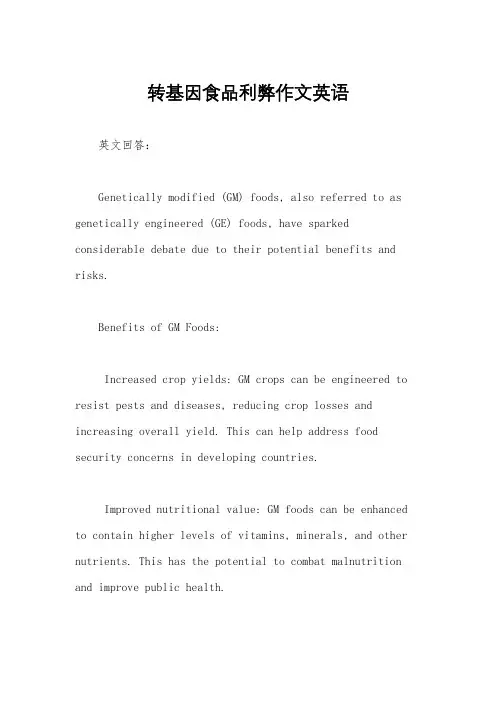
转基因食品利弊作文英语英文回答:Genetically modified (GM) foods, also referred to as genetically engineered (GE) foods, have sparked considerable debate due to their potential benefits and risks.Benefits of GM Foods:Increased crop yields: GM crops can be engineered to resist pests and diseases, reducing crop losses and increasing overall yield. This can help address food security concerns in developing countries.Improved nutritional value: GM foods can be enhanced to contain higher levels of vitamins, minerals, and other nutrients. This has the potential to combat malnutrition and improve public health.Resistance to environmental stressors: GM crops can be engineered to tolerate drought, heat, and other environmental stressors. This can increase agricultural productivity in challenging environments and reducereliance on synthetic fertilizers and pesticides.Risks of GM Foods:Health concerns: Critics argue that the long-term health effects of consuming GM foods are not fully understood. Concerns include potential allergies, increased toxicity, and antibiotic resistance due to the insertion of foreign genes.Environmental impact: GM crops can cross-pollinate with non-GM varieties, potentially introducing novel genes into natural ecosystems. This raises concerns about unintended consequences on biodiversity and gene flow.Economic issues: The development and commercialization of GM seeds can involve significant intellectual property rights and control by biotechnology companies. This cancreate concerns about farmer autonomy and market competition.Weighing the Benefits and Risks:The debate over GM foods is complex and requirescareful consideration of the potential benefits and risks. While GM foods have the potential to address food security and improve nutrition, concerns about health and environmental impacts must be thoroughly evaluated through rigorous scientific research and oversight.中文回答:转基因食品利弊。
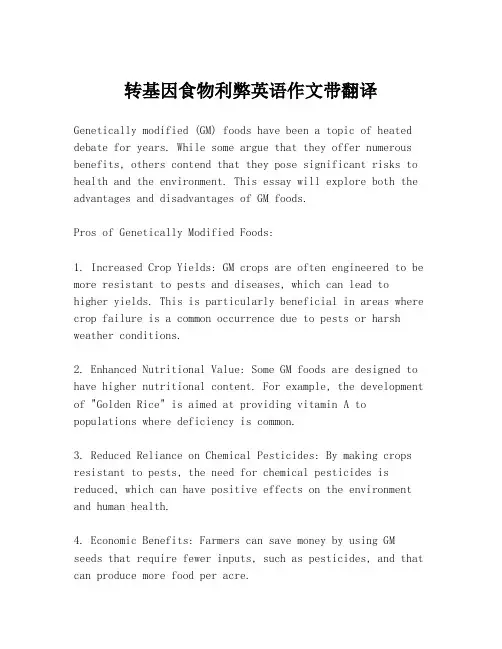
转基因食物利弊英语作文带翻译Genetically modified (GM) foods have been a topic of heated debate for years. While some argue that they offer numerous benefits, others contend that they pose significant risks to health and the environment. This essay will explore both the advantages and disadvantages of GM foods.Pros of Genetically Modified Foods:1. Increased Crop Yields: GM crops are often engineered to be more resistant to pests and diseases, which can lead to higher yields. This is particularly beneficial in areas where crop failure is a common occurrence due to pests or harsh weather conditions.2. Enhanced Nutritional Value: Some GM foods are designed to have higher nutritional content. For example, the development of "Golden Rice" is aimed at providing vitamin A to populations where deficiency is common.3. Reduced Reliance on Chemical Pesticides: By making crops resistant to pests, the need for chemical pesticides is reduced, which can have positive effects on the environment and human health.4. Economic Benefits: Farmers can save money by using GM seeds that require fewer inputs, such as pesticides, and that can produce more food per acre.Cons of Genetically Modified Foods:1. Potential Health Risks: There are concerns that GM foods may cause allergic reactions or other health problems, although scientific consensus has not yet fully established these risks.2. Environmental Impact: Critics argue that GM crops can crossbreed with wild plants, leading to the spread ofmodified genes in the wild, which could have unforeseen ecological consequences.3. Monoculture and Loss of Biodiversity: The widespread adoption of GM crops can lead to a reduction in agricultural biodiversity, as farmers may choose to grow only a few GM varieties.4. Corporate Control: Many GM seeds are patented by large corporations, which can lead to increased costs for farmers and a dependency on these companies for seeds.In conclusion, while GM foods offer the potential for increased food security and enhanced nutrition, there arevalid concerns regarding their safety and environmental impact. It is crucial for ongoing research and transparent labeling to ensure that the benefits of GM foods can be realized without compromising human health or the environment.翻译:转基因(GM)食品多年来一直是激烈争论的话题。
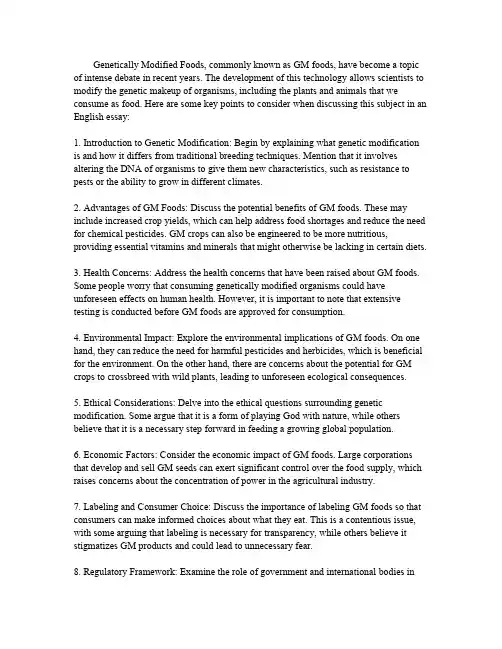
Genetically Modified Foods,commonly known as GM foods,have become a topic of intense debate in recent years.The development of this technology allows scientists to modify the genetic makeup of organisms,including the plants and animals that we consume as food.Here are some key points to consider when discussing this subject in an English essay:1.Introduction to Genetic Modification:Begin by explaining what genetic modification is and how it differs from traditional breeding techniques.Mention that it involves altering the DNA of organisms to give them new characteristics,such as resistance to pests or the ability to grow in different climates.2.Advantages of GM Foods:Discuss the potential benefits of GM foods.These may include increased crop yields,which can help address food shortages and reduce the need for chemical pesticides.GM crops can also be engineered to be more nutritious, providing essential vitamins and minerals that might otherwise be lacking in certain diets.3.Health Concerns:Address the health concerns that have been raised about GM foods. Some people worry that consuming genetically modified organisms could have unforeseen effects on human health.However,it is important to note that extensive testing is conducted before GM foods are approved for consumption.4.Environmental Impact:Explore the environmental implications of GM foods.On one hand,they can reduce the need for harmful pesticides and herbicides,which is beneficial for the environment.On the other hand,there are concerns about the potential for GM crops to crossbreed with wild plants,leading to unforeseen ecological consequences.5.Ethical Considerations:Delve into the ethical questions surrounding genetic modification.Some argue that it is a form of playing God with nature,while others believe that it is a necessary step forward in feeding a growing global population.6.Economic Factors:Consider the economic impact of GM rge corporations that develop and sell GM seeds can exert significant control over the food supply,which raises concerns about the concentration of power in the agricultural industry.beling and Consumer Choice:Discuss the importance of labeling GM foods so that consumers can make informed choices about what they eat.This is a contentious issue, with some arguing that labeling is necessary for transparency,while others believe it stigmatizes GM products and could lead to unnecessary fear.8.Regulatory Framework:Examine the role of government and international bodies inregulating GM foods.Its important to have a robust framework to ensure safety and ethical considerations are taken into account.9.Future Prospects:Conclude by considering the future of GM foods.With advances in technology,its likely that genetic modification will play an increasingly important role in food production.However,its crucial to balance innovation with caution to ensure the safety and sustainability of our food supply.10.Personal Reflection:End your essay with a personal reflection on the topic.What are your thoughts on the use of GM foods?Do you believe the benefits outweigh the potential risks,or vice versa?Remember to structure your essay with a clear introduction,body paragraphs that explore each point in detail,and a conclusion that summarizes your main e evidence and examples to support your points,and consider presenting both sides of the argument to show a balanced view.。
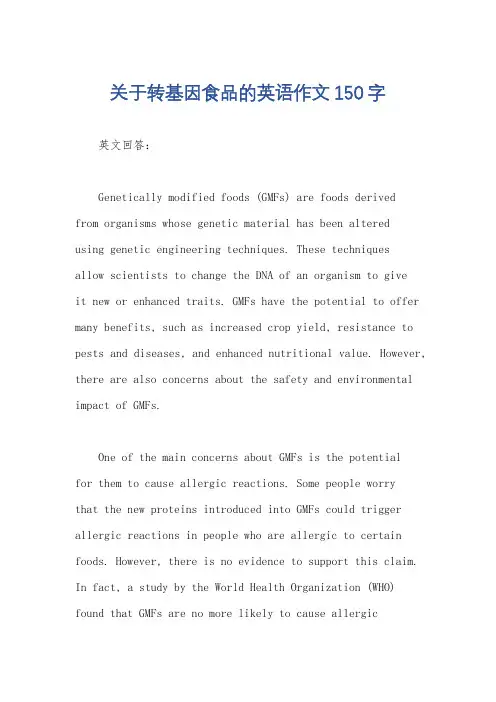
关于转基因食品的英语作文150字英文回答:Genetically modified foods (GMFs) are foods derivedfrom organisms whose genetic material has been alteredusing genetic engineering techniques. These techniquesallow scientists to change the DNA of an organism to giveit new or enhanced traits. GMFs have the potential to offer many benefits, such as increased crop yield, resistance to pests and diseases, and enhanced nutritional value. However, there are also concerns about the safety and environmental impact of GMFs.One of the main concerns about GMFs is the potentialfor them to cause allergic reactions. Some people worrythat the new proteins introduced into GMFs could trigger allergic reactions in people who are allergic to certain foods. However, there is no evidence to support this claim. In fact, a study by the World Health Organization (WHO) found that GMFs are no more likely to cause allergicreactions than conventional foods.Another concern about GMFs is the potential for them to harm the environment. Some people worry that GMFs could escape into the environment and cross-pollinate with wild plants, creating new superweeds that are resistant to herbicides. However, there is no evidence to support this claim. In fact, a study by the National Academy of Sciences found that GMFs are not more likely to escape into the environment than conventional crops.Overall, the evidence suggests that GMFs are safe for human consumption and the environment. However, more research is needed to address the concerns that people have about them.中文回答:转基因食品是指利用基因工程技术改变了其遗传物质的生物所产生的食品。
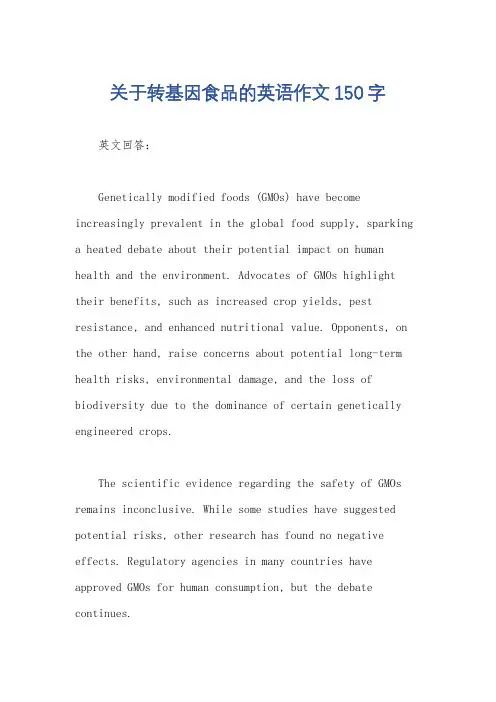
关于转基因食品的英语作文150字英文回答:Genetically modified foods (GMOs) have become increasingly prevalent in the global food supply, sparking a heated debate about their potential impact on human health and the environment. Advocates of GMOs highlight their benefits, such as increased crop yields, pest resistance, and enhanced nutritional value. Opponents, on the other hand, raise concerns about potential long-term health risks, environmental damage, and the loss of biodiversity due to the dominance of certain genetically engineered crops.The scientific evidence regarding the safety of GMOs remains inconclusive. While some studies have suggested potential risks, other research has found no negative effects. Regulatory agencies in many countries have approved GMOs for human consumption, but the debate continues.One of the primary concerns associated with GMOs is their potential impact on human health. Some critics argue that genetically engineered foods may contain allergens, toxins, or other harmful substances that could cause adverse health effects. However, rigorous scientific studies have not yet provided consistent evidence to support these claims.Another concern raised by opponents of GMOs is their impact on the environment. The widespread use ofgenetically modified crops could lead to the development of herbicide-resistant weeds, harming the biodiversity of natural ecosystems. Additionally, the transfer of genetically modified genes to non-target species, such as insects or wild plants, could have unforeseen consequences for the genetic diversity of the food chain.Despite these concerns, GMOs also present potential benefits. Increased crop yields could help feed a growing global population, while pest resistance can reduce the need for chemical pesticides. Moreover, geneticallymodified crops can be engineered to contain enhanced nutritional value, helping to address malnutrition in certain regions.The debate surrounding GMOs is complex, with both pros and cons to consider. While scientific research continues to evaluate their safety and potential risks, it is crucial to approach this issue with a balanced perspective, weighing the potential risks and benefits to make informed decisions.中文回答:转基因食品(GMOs)在全球粮食供应中的比重越来越大,引发了关于它们对人类健康和环境潜在影响的激烈争论。
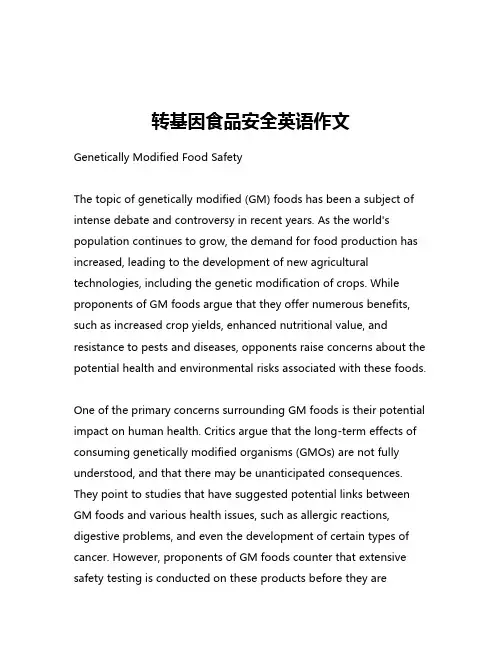
转基因食品安全英语作文Genetically Modified Food SafetyThe topic of genetically modified (GM) foods has been a subject of intense debate and controversy in recent years. As the world's population continues to grow, the demand for food production has increased, leading to the development of new agricultural technologies, including the genetic modification of crops. While proponents of GM foods argue that they offer numerous benefits, such as increased crop yields, enhanced nutritional value, and resistance to pests and diseases, opponents raise concerns about the potential health and environmental risks associated with these foods.One of the primary concerns surrounding GM foods is their potential impact on human health. Critics argue that the long-term effects of consuming genetically modified organisms (GMOs) are not fully understood, and that there may be unanticipated consequences. They point to studies that have suggested potential links between GM foods and various health issues, such as allergic reactions, digestive problems, and even the development of certain types of cancer. However, proponents of GM foods counter that extensive safety testing is conducted on these products before they areapproved for human consumption, and that the scientific evidence does not support these claims.Another major concern is the potential environmental impact of GM crops. Opponents argue that the use of GM crops can lead to the development of herbicide-resistant weeds and the loss of biodiversity, as the introduction of genetically modified organisms can disrupt the natural ecosystem. They also raise concerns about the potential for GM crops to cross-pollinate with non-GM crops, leading to the unintended spread of genetically modified traits. Proponents of GM foods, on the other hand, argue that these crops can actually help to reduce the use of harmful pesticides and herbicides, and that they can contribute to more sustainable and environmentally-friendly agricultural practices.Another significant concern is the issue of labeling and consumer choice. Many consumers believe that they have a right to know whether the food they are purchasing contains genetically modified ingredients, and they argue that all GM foods should be clearly labeled as such. Proponents of GM foods, however, contend that current labeling requirements are adequate and that mandatory labeling would be costly and unnecessary, as there is no scientific evidence that GM foods are inherently unsafe.Despite these ongoing debates, it is clear that the use of GM foodswill continue to be a significant part of the global food system. As the world's population grows and the demand for food increases, the development of new agricultural technologies, including genetic modification, will likely play an increasingly important role in ensuring food security and sustainability.In conclusion, the debate over the safety of GM foods is a complex and multifaceted issue that involves a range of scientific, environmental, and ethical considerations. While both proponents and opponents of GM foods make compelling arguments, it is important for consumers to stay informed and to make their own informed decisions about the foods they choose to consume. Ultimately, the safety and sustainability of the global food system will depend on the continued research, regulation, and public dialogue surrounding this important issue.。
转基因食品的危害英语作文英文回答:Genetically modified foods (GMFs) have become a staple in our modern food system, promising increased crop yields, reduced pesticide use, and enhanced nutritional value. However, concerns persist regarding their potential risks to human health and the environment.Health Concerns。
One primary concern is the possibility of allergic reactions or toxic effects from consuming GMFs. Critics argue that genetic modifications could introduce foreign proteins into food products that may trigger allergies or intolerances in susceptible individuals. Studies have reported allergic reactions to soy and corn that have been genetically modified to express proteins from other organisms.Another concern is the potential for antibiotic resistance transfer. Many GMFs are developed usingantibiotic-resistant genes as markers to facilitate gene selection. There are fears that these genes could transfer to bacteria in the human gut, making infections more difficult to treat.Environmental Concerns。
转基因食物英语作文Genetically Modified Foods。
Genetically modified foods, or GMOs, are foods that have been altered in some way through genetic engineering. This process involves taking genes from one organism and inserting them into another in order to give it certain desirable traits, such as resistance to pests or a longer shelf life.While GMOs have been around for several decades, they have become increasingly controversial in recent years. Some people argue that they offer many benefits, such as increased crop yields and reduced pesticide use. Others, however, are concerned about the potential risks to human health and the environment.One of the main concerns about GMOs is that they may have unintended consequences. For example, there is some evidence that they may cause allergic reactions in somepeople. Additionally, some studies have suggested that they may harm beneficial insects, such as bees, which arecrucial for pollination.Another concern is that GMOs may have negative effects on the environment. For example, they may lead to the development of superweeds or superbugs that are resistant to pesticides. This can lead to increased pesticide use, which can harm both the environment and human health.Despite these concerns, many people still support the use of GMOs. They argue that they offer many benefits, such as increased crop yields and reduced pesticide use. Additionally, they argue that the risks of GMOs are relatively low and that they are rigorously tested before being approved for use.In conclusion, genetically modified foods are a controversial topic that has divided many people. While some argue that they offer many benefits, others are concerned about the potential risks to human health and theenvironment. Ultimately, it is up to each individual to decide whether or not they want to consume GMOs.。
是否支持转基因食品英语作文{z}Title: The Support for Genetically Modified FoodsGenetically Modified Foods (GMFs) have been a topic of debate for many years.The question of whether we should support GMFs or not has sparked intense arguments among people from different backgrounds.In my opinion, the advantages of GMFs outweigh the disadvantages, and I am in favor of supporting them.Firstly, GMFs can help solve food shortages and reduce world hunger.With the world"s population growing rapidly, the demand for food is also increasing.Genetic modification can make crops more resistant to diseases, pests, and environmental stress, resulting in higher yields.This can help ensure food security and reduce the risk of famine in many parts of the world.Secondly, GMFs can improve the nutritional value of food.Genetic modification can enhance the content of essential vitamins and minerals in crops, making them more nutritious.For example, golden rice, a genetically modified rice variety, has been developed to address vitamin A deficiency in developing countries.Thirdly, GMFs can contribute to environmental protection.Genetic modification can make crops more drought-tolerant and less reliant on chemical inputs such as fertilizers and pesticides.This can reduce the environmental impact of agriculture, minimize soil erosion, and decreasethe pollution of water bodies.However, there are also concerns about the potential risks of GMFs, such as allergenicity, antibiotic resistance, and the impact on biodiversity.Moreover, there are ethical issues surrounding the patenting of GMOs and the potential exploitation of farmers in developing countries.To address these concerns, it is crucial to have strict regulations and monitoring in ernments should ensure that GMFs are thoroughly tested for safety before they are approved for consumption.Additionally, transparency and public participation should be prioritized in the decision-making process regarding GMFs.In conclusion, while there are legitimate concerns about the potential risks of GMFs, the benefits they offer in terms of food security, nutrition, and environmental protection cannot be overlooked.With appropriate regulations and public engagement, we can harness the potential of GMFs while minimizing the associated risks.Therefore, I support the development and adoption of genetically modified foods.。
转基因食物作文英文英文:Genetically modified foods, also known as GMOs, have been a controversial topic for many years. On one hand, supporters argue that GMOs can increase crop yields, reduce the use of pesticides, and even enhance the nutritional value of food. However, opponents of GMOs argue that they can have negative effects on human health and the environment.Personally, I am wary of GMOs. While the potential benefits are intriguing, I am concerned about the long-term effects on both our health and the environment. For example, some studies have suggested that GMOs can lead to the development of antibiotic-resistant bacteria, which could have serious consequences for public health. Additionally, the use of GMOs can lead to the loss of biodiversity andthe creation of "superweeds" that are resistant to herbicides.Furthermore, I believe that consumers have the right to know whether their food contains GMOs. In many countries, including the United States, there is no requirement for food manufacturers to label their products as containing GMOs. This lack of transparency is concerning, as it makesit difficult for consumers to make informed choices aboutthe food they eat.Overall, while GMOs may have some potential benefits, I believe that we need to proceed with caution and prioritize the long-term health of both humans and the environment.中文:转基因食物,也称为GMO,多年来一直是一个备受争议的话题。
英语作文转基因食品Genetically Modified Foods。
Genetically modified foods, also known as genetically engineered foods, are products that have been modified through genetic engineering techniques. These techniques involve the manipulation of the genetic material of plants, animals, or microorganisms in order to create a new trait or characteristic that is not naturally found in the organism. The use of genetically modified foods has been a controversial issue for many years, with proponents arguing that they offer numerous benefits, while opponents argue that they pose significant risks to human health and the environment.One of the main benefits of genetically modified foods is that they can help to increase crop yields and improve food security. By introducing genes that make plants more resistant to pests, diseases, and environmental stresses, farmers can produce more food per acre of land and reducethe need for harmful pesticides and herbicides. In addition, genetically modified crops can be engineered to have longer shelf lives, which can help to reduce food waste andimprove access to fresh produce in areas whererefrigeration is not readily available.Another potential benefit of genetically modified foods is that they can be used to develop crops that are more nutritious. For example, scientists have developed genetically modified rice that contains higher levels of vitamin A, which can help to prevent blindness in childrenin developing countries. Similarly, genetically modified crops can be engineered to produce healthier oils or to be more resistant to drought, which can help to improve the nutritional quality of food and reduce the risk of malnutrition.Despite these potential benefits, many people are concerned about the potential risks of genetically modified foods. One of the main concerns is that they could have negative effects on human health. Some studies have suggested that genetically modified foods could causeallergic reactions or have other unintended health consequences. In addition, there are concerns that genetically modified crops could crossbreed with wild relatives, creating new species that could be harmful to the environment.Another concern is that the use of genetically modified foods could have negative impacts on small farmers andrural communities. Some critics argue that the high cost of genetically modified seeds and the reliance on specific herbicides and pesticides could lead to increased debt and decreased biodiversity, which could have negative impacts on the livelihoods of small farmers.In conclusion, the use of genetically modified foods is a complex issue with both potential benefits and risks. While proponents argue that they can help to increase crop yields, improve food security, and develop more nutritious crops, opponents argue that they pose significant risks to human health and the environment. As such, it is important for policymakers and consumers to carefully consider thepotential impacts of genetically modified foods and to make informed decisions about their use.。
转基因食品英语作文200Genetically Modified Food。
Genetically modified food, also known as genetically engineered food, is a type of food that has been altered in some way through the use of genetic engineering techniques. This technology allows scientists to manipulate the DNA of plants and animals in order to produce desired traits, such as resistance to pests or increased nutritional value.While some people believe that genetically modified food is a safe and effective way to address issues like hunger and malnutrition, others are concerned about the potential health and environmental risks associated with these products. In this essay, I will explore the pros and cons of genetically modified food and offer my own perspective on this controversial issue.On the one hand, proponents of genetically modified food argue that these products have the potential to solvesome of the world's most pressing food-related problems.For example, genetically modified crops can be designed to resist pests and diseases, which can reduce the need for harmful pesticides and herbicides. In addition, scientists can use genetic engineering to increase the nutritional value of food, which could help to address malnutrition in developing countries.Another potential benefit of genetically modified foodis that it could help to increase crop yields, which would be particularly important in areas with limited arable land. By making crops more resistant to drought, for example, farmers could produce more food with less water, whichwould be especially important in regions that are prone to drought or other climate-related challenges.Despite these potential benefits, however, there are also a number of concerns about the safety andenvironmental impact of genetically modified food. For example, some studies have suggested that genetically modified crops could have negative effects on human health, such as causing allergic reactions or contributing to thedevelopment of antibiotic-resistant bacteria.In addition, there are concerns about the potential environmental impact of genetically modified crops. For example, some critics argue that these crops could crossbreed with wild plants, creating "superweeds" that are resistant to herbicides and difficult to control. Others worry that genetically modified crops could harm beneficial insects, such as bees, which are essential for pollination.Given these concerns, it is clear that more research is needed to fully understand the potential risks and benefits of genetically modified food. In the meantime, however, it is important for consumers to be aware of the potential risks associated with these products and to make informed decisions about the food they eat.In my opinion, while genetically modified food may have some potential benefits, the risks associated with these products are simply too great to justify their widespread use. Until more research is conducted to fully understand the potential health and environmental risks of geneticallymodified food, I believe it is best to err on the side of caution and avoid these products whenever possible.。
班级:A17班姓名:学号:Should Genetically-modified Food be Stopped?
Nowadays, the number of genetically-modified food is steadily increasing. There is an argument that whether this kind of food should be stopped . As far as I am concerned , genetically-modified food should not be stopped.
Firstly, there is necessity for genetically-modified food to exist. Genetically-modified food belongs to food. The world is lack of resources. Every day, millions of people around the world eat only the bare minimum of food to keep themselves alive. They will be very grateful for having this kind of food to survive.
Secondly, it is easier for us to plant genetically-modified food. At the same time, the production cost is also greatly reduced. As a result ,food prices will increasingly low. There is no doubt that it is good news for consumers.
Thirdly, It will reduce the use of pesticides and then avoid the pollution of the environment.
In addition, genetically-modified food can bring us many other benefits, for example, increasing food nutrition, increasing the types of food and so on.
However,although genetically-modified food have so many advantages, some people still insist that they should never eat
genetically-modified food. They are afraid of potential threat that this kind of food will be harm to their health. In fact ,genetically-modified food has passed the the strict test of international organizations. It is safe. There has been no evidence to prove that genetically-modified food is harm to humans so far. To some extent, we can consider this kind of food to be perfectly safe. As you know, at present there is a lot of genetically-modified food in the market, such us genetically-modified soybean ,Transgenic papaya and so on. Many people have eaten this kind of food for some years, but we have not exactly confirmed that some one falls ill after eating genetically-modified food.So there is no need to worry much about the safety problem. We can eat them as we like.
All in all, we should not stop genetically-modified food. But, this kind of food may cause some people’s allergic reactions. So in the process of producing genetically-modified food, we should eliminate the genes which can cause allergic reactions and do the digestion experiment in order to avoid the harm to human body.。